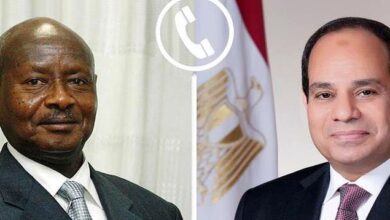CAIRO – Egyptian President Anwar Sadat, gunned down by Islamists at a military parade in Cairo 30 years ago on Thursday, left a political legacy that survived largely unscathed in the long reign of his successor, Hosni Mubarak.
His peace treaty with Israel still stands, the first between the Jewish state and any of its Arab neighbors, and after the openings Sadat gave to the private sector, Egypt has evolved into a market economy that has turned its back on the socialist policies of the 1960s and early 1970s.
But eight months after the popular uprising that overthrew Mubarak on February 11, some aspects of Sadat's legacy have vanished. Others, including the peace treaty itself, may have to adapt to the political transition that Egypt's interim military leaders have initiated.
Tareq al-Zumur, one of the Islamists who took part in the conspiracy to assassinate Sadat, said Sadat had laid the groundwork for all the oppressive policies followed by Mubarak, who sat next to him as vice president at the parade on October 6, 1981, but that the 2011 uprising had set Egypt on a new democratic path of no-return.
"The Hosni Mubarak regime never strayed one inch from the policies followed by Sadat," he told Reuters in an interview on the eve of the anniversary. If rigged elections were one of the hallmarks of the Mubarak era, Sadat set the trend in the elections of 1979, when he tried to ensure that no opponents of the peace treaty survived in parliament, he added.
But with the overthrow of Mubarak, the strict controls on political activity, which kept the powerful Islamist movement on the sidelines of public life for decades, broke down overnight.
The State Security police, which specialized in harassing the opposition, have had to change their name and give up some of their powers, even if critics say they continue many of the same old practices.
Close diplomatic and strategic cooperation with the United States, which Mubarak inherited from Sadat and made one of the fundamentals of Egyptian foreign policy, is now contested and may be an early casualty under a democratically elected government.
Prime Minister Essam Sharaf said in September that the 1979 peace treaty with Israel, one of the cornerstones of the Cairo-Washington relationship, was not sacrosanct and could be changed for the sake of peace or the good of the region.
"The Camp David agreement is not a sacred thing and is always open to discussion with what would benefit the region and the case of fair peace … and we could make a change if needed," he told a Turkish television station.
Sharaf may have been thinking of minor, mutually agreed adjustments to the limits on Egyptian troop deployments in Sinai, but many of the revolutionaries who took to the streets in January envisage a more radical shift in relations with the Jewish state.
The crowds who penned Israeli embassy staff in their embassy in downtown Cairo on September 9 and removed the Israeli flag from the building for the second time this year said they wanted the embassy closed and the Israeli ambassador expelled.
The peace treaty is closely linked to the contentious question of US military and economic aid to Egypt, which is running at about US$1.5 billion a year, down from about $2 billion in Sadat's last years, but still one of the largest packages any country receives from the United States.
When Sadat was in power and the Egyptian economy was on the ropes, US aid in the form of wheat on concessional terms was sometimes the only thing that prevented a repetition of the bread riots of January 1977, one of the most serious crises Sadat ever faced.
The economic component of the aid has shrunk to less than $5 per Egyptian per year, from about $20 at 1970s values under Sadat, but the military component gives the United States leverage over the Egyptian generals who took over from Mubarak in February.
Defense Secretary Leon Panetta, visiting Cairo this week, tried to link Sadat and the Egyptian revolution, saying that Sadat died "for the cause of peace." He added: "Now the people of Egypt have the opportunity to build on that important legacy that Anwar Sadat established."
For Tareq al-Zumur, the lesson is quite the opposite. For him and for many others, the Egyptian revolution was a break from the legacy of both Sadat and Mubarak, and an assertion of the will of the Egyptian people, who largely remain hostile to Israeli and US policies.
Not all Islamists agree, however. Nageh Ibrahim, a leading member of Jama'a al-Islamiya, which took up arms against Mubarak in the 1990s and lost, said Sadat had brought the Islamist movement many benefits and that in retrospect it was a mistake to kill him in 1981.
"[After the assassination] many doors for missionary activity were closed, all the benefits went to the leftists and the whole Islamist movement was harmed. Sadat had stopped torture and abolished emergency law, but we young people didn't realize the value of those steps until after his death," Ibrahim told Rose Al-Youssef magazine.
One way or the other, one of the most significant changes since February has been the reversal in the fortunes of the Islamist movement, which Sadat initially promoted as a counterweight to his leftist and Arab nationalist enemies, and then began to suppress in his final months.
Now Islamists of all kinds – the Muslim Brotherhood, conservative salafists and post-modern liberal Islamists – are operating openly in Egypt and are likely to win many seats in the parliamentary elections scheduled to start in late November.
Even if that comes 30 years late, and in a popular and potentially democratic form that Sadat's assassins did not envisage when they pumped dozens of bullets into his body, the change can be interpreted as a form of vindication.
The main assassin, Khaled al-Islambuli, boasted at his trial that he had killed the Pharaoh, a symbol of tyranny in Islamic tradition. But it took millions of people on the streets of Egypt, for 18 days in January and February, to topple the Pharaoh that succeeded him, possibly Egypt's last.
"The January 25 revolution established new rules for running movements and reforming societies that do not at all include the use of violence," said Zumur.




